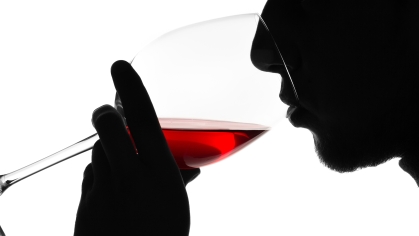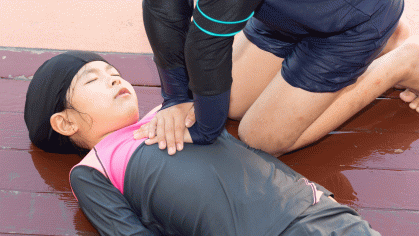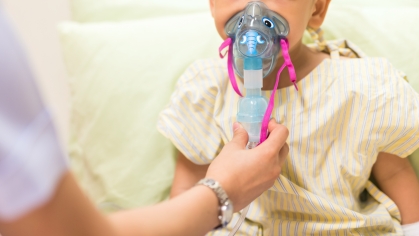Rutgers Fashions a Biomedical Springboard for Newark-Area High School Students
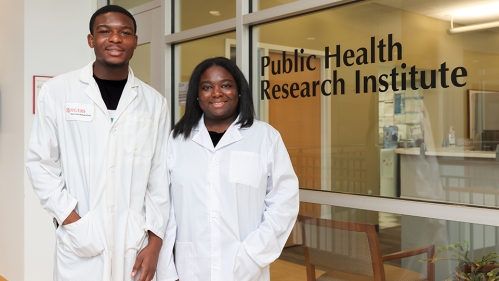
New Rutgers Health summer school seeks to inspire the next generation of medical researchers through practical, hands-on learning
For Regina Bruce, a science teacher at Newark’s Technology High School and a Rutgers master’s student in biomedical sciences, the summer was about more than beach time and barbecues.
It also was an opportunity to hone her skills at the bench – a Rutgers New Jersey Medical School lab bench, to be precise.
Bruce was a unpaid educator in Rutgers’ inaugural Pathway to Scientist program, an initiative from the Rutgers University Office of Community Engagement linking researchers at Rutgers New Jersey Medical School (NJMS) with Newark-area high school teachers and students.
“My lab colleagues helped me figure out ways to incorporate biomedical research practices into a high school science curriculum,” Bruce said.
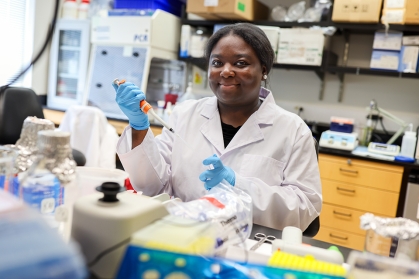
Working with J. Patrick O’Connor, an associate professor of orthopedics and a member of the Center for Immunity and Inflammation at NJMS, Bruce said she studied “DNA extraction, DNA genotyping and other really cool techniques that I can teach my students.”
Launched this year – and modelled on a similar initiative for Rutgers-Newark undergraduates – the high school pathway program aims to provide biomedical research opportunities to students and teachers in the Newark community and to inspire future biomedical researchers by transferring knowledge from the lab to the classroom. For about five weeks starting in mid-July, participants spend up to 20 hours a week working as assistants in separate NJMS labs.
Thaddaeus Diggs, director of community engagement for Rutgers Health, advertised the program by distributing fliers to Newark high schools.
Selection is competitive: Of the 38 students and two teachers from 16 Newark high schools who applied, three participants – three students and Bruce – were selected.
William C. Gause, the senior associate dean for research at NJMS, said the high school program was conceived to serve as a bridge between Newark high schools and Rutgers scientists.
“It’s a terrific springboard to college-level science,” Gause said. “It gives students and teachers a feel for what’s happening in an actual, active lab, and may serve to turn them on to these professions.”
Nan Gao, a professor in the Department of Pharmacology, Physiology and Neuroscience and a member of the Center for Immunity and Inflammation at the medical school as well as the director for both pathway programs, said he hopes to expand the high school course in coming years. Yet doing so won’t be easy. For starters, not every professor can translate university-level laboratory practices into teachable high school science, he said.
Then there’s the paperwork. Gao said the administrative burden for biomedical labs to recruit high school student researchers and volunteer teachers for the summer is “significant.” But as long as interest remains, NJMS will continue working to develop the program, he said.
Part of what made Bruce’s application appealing to faculty was her experience. In addition to pursuing a master’s degree, she’s also researched the connection between alveolar bone loss and carotid artery calcification, the buildup of plaque on artery walls.
More than anything, though, it was her desire to translate modern research techniques into high school-level curriculum. Bruce teaches biomedical science to sophomores, juniors and seniors.
“We have a lot of students who are interested in research, some more on the clinical side, like nursing, and others on the technical side, like radiology,” she said. “As educators, we want to give our students exposure to the latest technologies and research methods.”
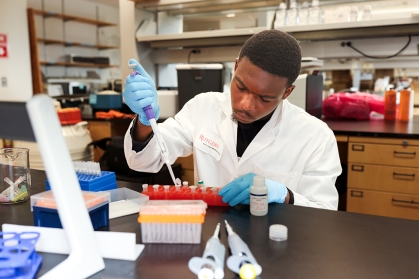
Deslie Ayerh, 17, a senior at Weequahic High School and one of the program’s three student participants (the other two were from Science Park High School and Arts High School), said he applied to the course “to get more of an understanding on science and health, particularly how people get infected by diseases.”
Ayerh spent his summer growing cells in Selvakumar Subbian’s laboratory at the Public Health Research Institute.
Ayerh isn’t sure biomedical research will be his calling after high school; a career in marketing or business might be more his speed, he said. But the experience gained during the pathway program will give him a leg up when he applies to college.
“This gives me a head start on what students usually learn in college,” he said. “Putting down [on my resume] that I did this in high school will leave a good impression.”
And that, for Gause, is why the program exists. The high school initiative is meant to create “more interactions with the Newark community” and serve as a “potent outreach program” for future students at the medical school, the NJMS senior associate dean said.
“It’s a win-win for everybody,” said Gause.

